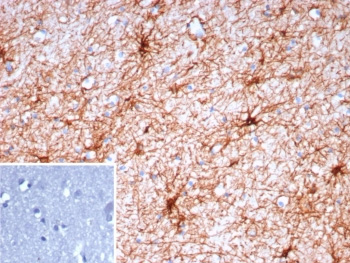- Tel: 858.663.9055
 Email: info@nsjbio.com
Email: info@nsjbio.com
- Tel: 858.663.9055
- Email: info@nsjbio.com
Glial Fibrillary Acidic Protein Antibody reagents target GFAP, an intermediate filament protein expressed in astrocytes, the star-shaped glial cells of the central nervous system. GFAP provides structural support to astrocytic processes and contributes to the maintenance of the blood–brain barrier, synaptic function, and response to neural injury.
GFAP expression is upregulated following trauma, ischemia, or neurodegenerative disease, making it one of the most widely used markers of astrogliosis. Aberrant GFAP expression is linked to Alexander disease, gliomas, and multiple sclerosis. The Glial Fibrillary Acidic Protein Antibody is therefore essential for studying astrocyte biology, CNS pathology, and regenerative responses. Meanwhile, the GFAP Antibody more broadly supports research in neurodevelopment, neurodegeneration, and translational neuroscience.
NSJ Bioreagents supplies Glial Fibrillary Acidic Protein Antibodies validated for immunohistochemistry, immunofluorescence, western blotting, and ELISA. Each Glial Fibrillary Acidic Protein Antibody is rigorously tested for specificity, ensuring strong signal with minimal cross-reactivity.
By selecting GFAP Antibody products from NSJ Bioreagents, scientists gain reagents optimized for reproducibility across diverse experimental platforms. Our antibodies deliver sharp astrocyte staining in brain sections, consistent detection in protein lysates, and reliable results in translational research. Comprehensive datasheets, recommended controls, and validated protocols ensure consistent performance across studies.
The Glial Fibrillary Acidic Protein Antibody has wide-ranging applications in neuroscience, pathology, and translational medicine.
Glial Fibrillary Acidic Protein Antibodies label astrocytes in brain and spinal cord tissues.
The Glial Fibrillary Acidic Protein Antibody clarifies astrocyte roles in synaptic support and neural development.
GFAP Antibody reagents are used in developmental studies of CNS maturation.
Glial Fibrillary Acidic Protein Antibodies detect reactive astrogliosis after trauma or ischemia.
The Glial Fibrillary Acidic Protein Antibody supports studies of scar formation after spinal cord injury.
GFAP Antibody products monitor astrocyte response in regenerative therapy models.
Glial Fibrillary Acidic Protein Antibodies are applied in Alzheimer’s, Parkinson’s, and ALS research.
The Glial Fibrillary Acidic Protein Antibody detects astrocyte activation during disease progression.
GFAP Antibody reagents support biomarker validation in neurodegeneration.
Glial Fibrillary Acidic Protein Antibodies reveal astrocyte involvement in multiple sclerosis.
The Glial Fibrillary Acidic Protein Antibody clarifies neuroinflammatory pathways.
Glial Fibrillary Acidic Protein Antibodies are diagnostic tools for astrocytomas and glioblastomas.
The Glial Fibrillary Acidic Protein Antibody helps differentiate glial tumors from other CNS malignancies.
GFAP Antibody reagents provide prognostic biomarkers in neuro-oncology.
Glial Fibrillary Acidic Protein Antibodies support biomarker studies in cerebrospinal fluid and serum.
The Glial Fibrillary Acidic Protein Antibody is applied in clinical trials for CNS injury therapies.
GFAP Antibody reagents help validate non-invasive diagnostic assays.
Astrocytes are central to neural function and pathology, and the Glial Fibrillary Acidic Protein Antibody provides an indispensable tool for studying them. The GFAP Antibody more broadly supports applications in neurobiology, oncology, and regenerative research.
In basic neuroscience, Glial Fibrillary Acidic Protein Antibodies clarify astrocyte structure, signaling, and development. In injury models, the Glial Fibrillary Acidic Protein Antibody highlights gliosis and repair mechanisms. In disease-focused studies, GFAP Antibody tools validate biomarkers for neurodegeneration, demyelination, and gliomas.
Clinically, GFAP levels are increasingly studied as biomarkers in serum and cerebrospinal fluid for traumatic brain injury and neurological disease. By ensuring reliable detection, the Glial Fibrillary Acidic Protein Antibody bridges basic neuroscience with translational medicine.
GFAP is a hallmark marker of astrocytes, widely applied in research on neural biology, injury, and disease. The Glial Fibrillary Acidic Protein Antibody equips researchers and clinicians with a reliable tool for detecting GFAP expression, while the GFAP Antibody more broadly supports neuroscience, oncology, and regenerative research. By enabling precise detection and reproducibility, these antibodies remain essential for advancing brain science and improving neurological health.

IHC staining of FFPE human brain tissue with Glial Fibrillary Acidic Protein antibody (clone GFAP/9423). Inset: PBS used in place of primary Ab (secondary Ab negative control). HIER: boil tissue sections in pH 9 10mM Tris with 1mM EDTA for 20 min and allow to cool before testing.